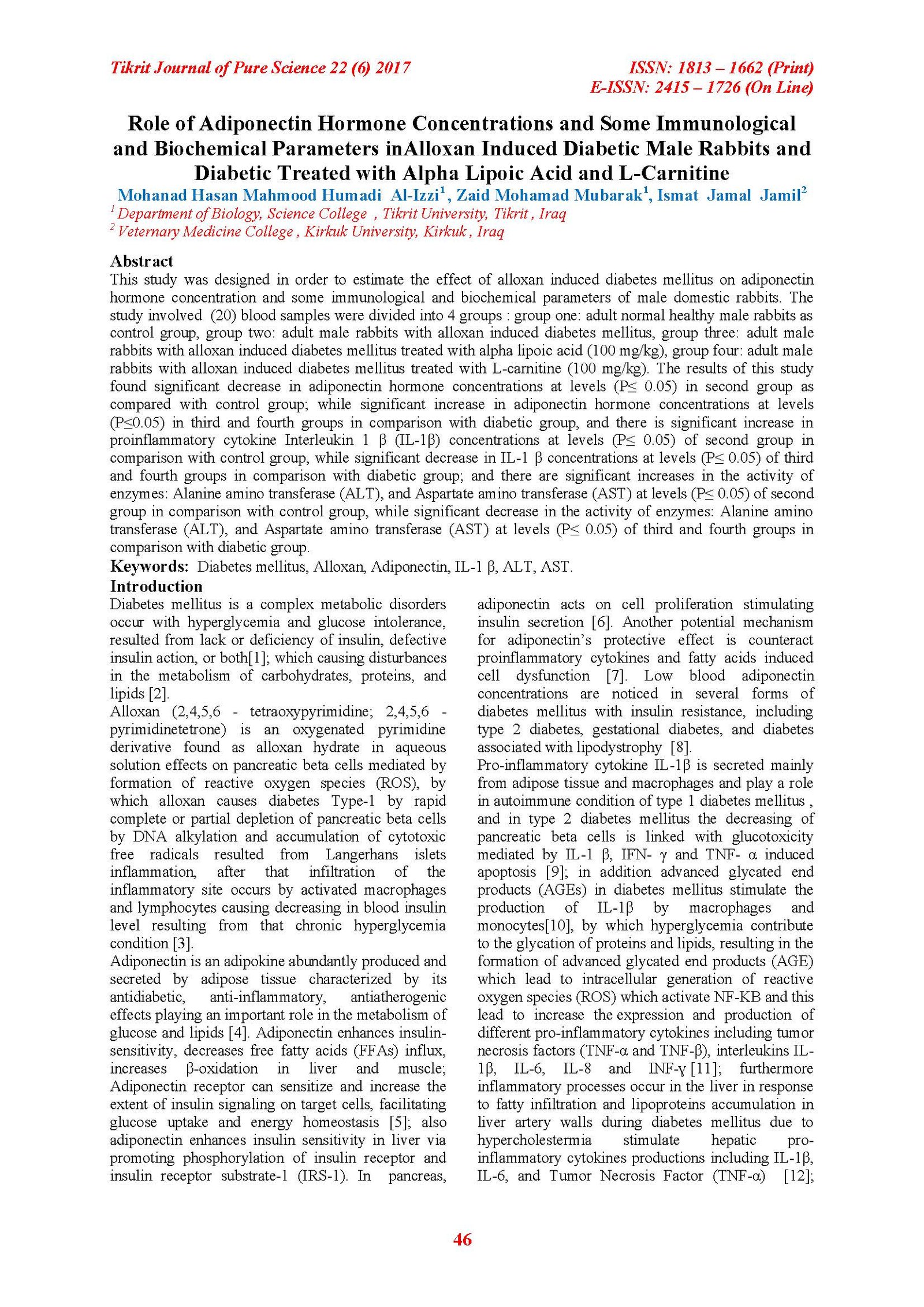Role of Adiponectin Hormone Concentrations and Some Immunological and Biochemical Parameters inAlloxan Induced Diabetic Male Rabbits and Diabetic Treated with Alpha Lipoic Acid and L-Carnitine
Main Article Content
Abstract
This study was designed in order to estimate the effect of alloxan induced diabetes mellitus on adiponectin hormone concentration and some immunological and biochemical parameters of male domestic rabbits. The study involved (20) blood samples were divided into 4 groups : group one: adult normal healthy male rabbits as control group, group two: adult male rabbits with alloxan induced diabetes mellitus, group three: adult male rabbits with alloxan induced diabetes mellitus treated with alpha lipoic acid (100 mg/kg), group four: adult male rabbits with alloxan induced diabetes mellitus treated with L-carnitine (100 mg/kg). The results of this study found significant decrease in adiponectin hormone concentrations at levels (P≤ 0.05) in second group as compared with control group; while significant increase in adiponectin hormone concentrations at levels (P≤0.05) in third and fourth groups in comparison with diabetic group, and there is significant increase in proinflammatory cytokine Interleukin 1 β (IL-1β) concentrations at levels (P≤ 0.05) of second group in comparison with control group, while significant decrease in IL-1 β concentrations at levels (P≤ 0.05) of third and fourth groups in comparison with diabetic group; and there are significant increases in the activity of enzymes: Alanine amino transferase (ALT), and Aspartate amino transferase (AST) at levels (P≤ 0.05) of second group in comparison with control group, while significant decrease in the activity of enzymes: Alanine amino transferase (ALT), and Aspartate amino transferase (AST) at levels (P≤ 0.05) of third and fourth groups in comparison with diabetic group.
Article Details

This work is licensed under a Creative Commons Attribution 4.0 International License.
Tikrit Journal of Pure Science is licensed under the Creative Commons Attribution 4.0 International License, which allows users to copy, create extracts, abstracts, and new works from the article, alter and revise the article, and make commercial use of the article (including reuse and/or resale of the article by commercial entities), provided the user gives appropriate credit (with a link to the formal publication through the relevant DOI), provides a link to the license, indicates if changes were made, and the licensor is not represented as endorsing the use made of the work. The authors hold the copyright for their published work on the Tikrit J. Pure Sci. website, while Tikrit J. Pure Sci. is responsible for appreciate citation of their work, which is released under CC-BY-4.0, enabling the unrestricted use, distribution, and reproduction of an article in any medium, provided that the original work is properly cited.
References
1- Ozougwu, J. C.; Obimba, K. C.; Belonwu, C. D. and Unakalamba, C. B. (2013). The pathogenesis and pathophysiology of type 1 and type 2 diabetes mellitus. Journal of Physiology and Pathophysiolog ; 4(4): 46-57.
2- Menon, N. (2014). Metabolic Effects of the Consumption of Aqueous Kalanchoepinnata Preparation in Streptozotocin-Induced Diabetic Rats. Master thesis, College of Science and Engineering, Texas A and M University, Department of Life Sciences (USA).
3-Tripathi, V. and, Verma J. (2014). Different Models Used to Induce Diabetes: A Comprehensive Review. Int J Pharm Pharm Sci, Vol. 6, Issue 6: 29-32.
4-Adya, R.; Tan, B. K. and Randeva, H. S. (2015). Differential Effects of Leptin and Adiponectin in Endothelial Angiogenesis. Journal of Diabetes Research, Volume 2015, Article ID: 648239.
5-Alsaleh, A.F.F. (2015). Dietary, Genetic and Metabolic Determinants of Serum Adiponectin. PH.D. Thesis. King’s College London, School of Medicine, Diabetes and Nutritional Sciences Division.
6-Nigro, E.; Scudiero, O.; Monaco, M.L., Palmieri, A.; Mazzarella, G.; Costagliola, C.; Bianco, A. and Daniele, A. (2014). New Insight into Adiponectin Role in Obesity and Obesity-Related Diseases. Bio Med research international ;Volume 2014, Article ID: 658913.
7-Majebi, A. O. (2015). The role of adipokines in obesity related beta-cell failure of type-2 diabetes mellitus and endothelial cell dysfunction of cardiovascular diseases. PH.D. Thesis. University of Wolverhampton (UK).
8-Pala, H. G.; Ozalp, Y.; Yener, A. S.; Gerceklioglu, G.; Uysal, S. and Onvural, A. (2015). Adiponectin Levels in Gestational Diabetes Mellitus
and in Pregnant Women Without Glucose Intolerance. Adv Clin Exp Med; 24, 1: 85–92.
9-Keane, K. N.; Cruzat, V. F.; Carlessi, R.; De BittencourtJr, P. I. H. and Newsholme, P. (2015). Molecular Events Linking Oxidative Stress and Inflammation to Insulin Resistance and
